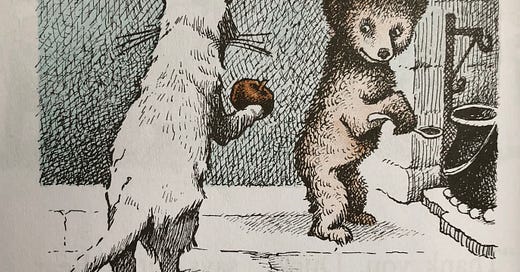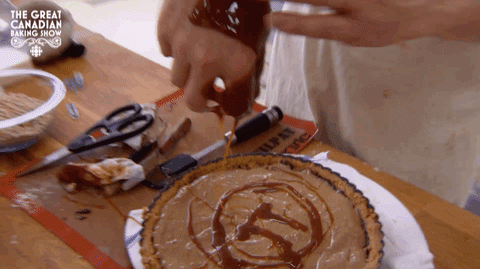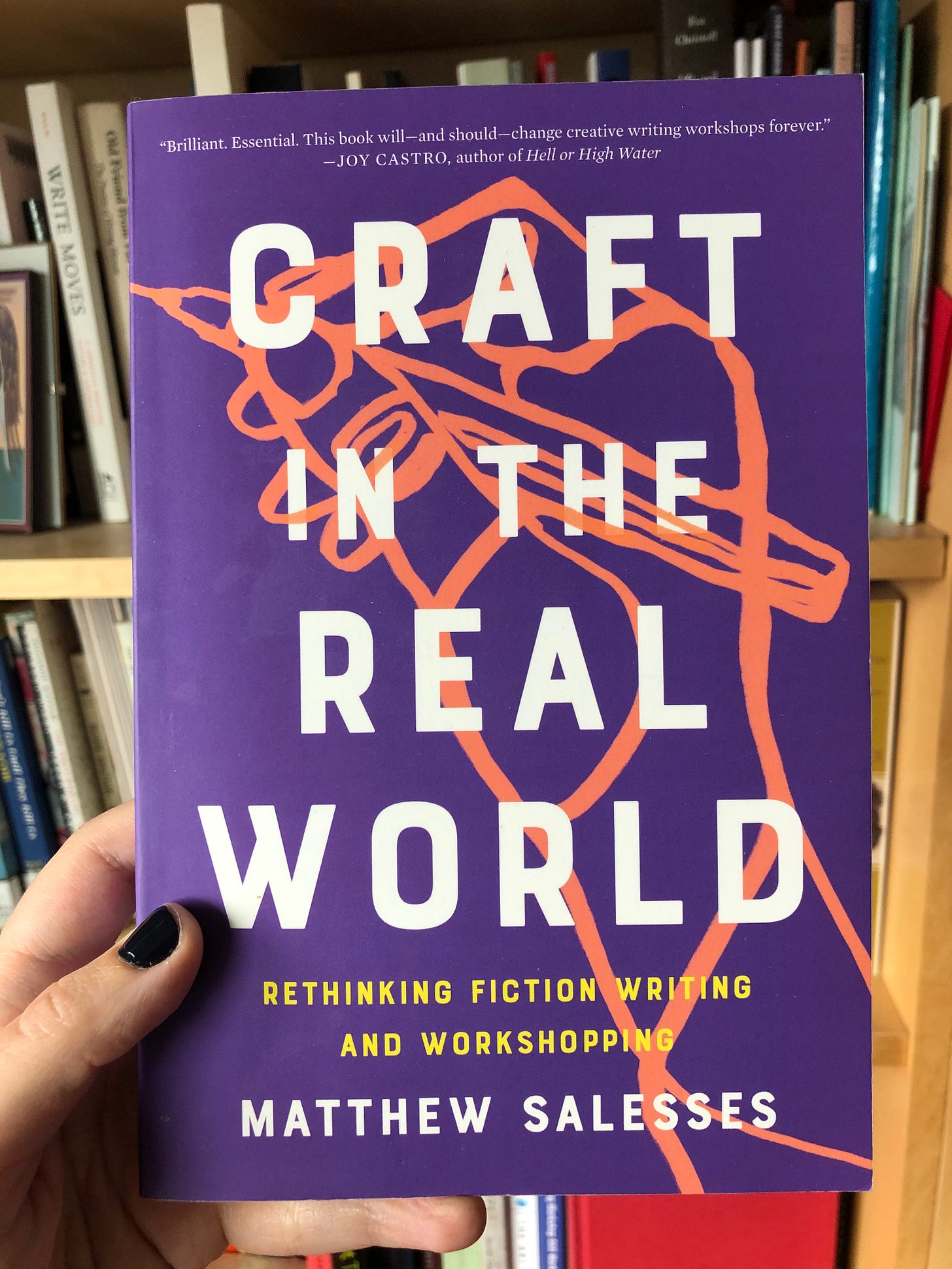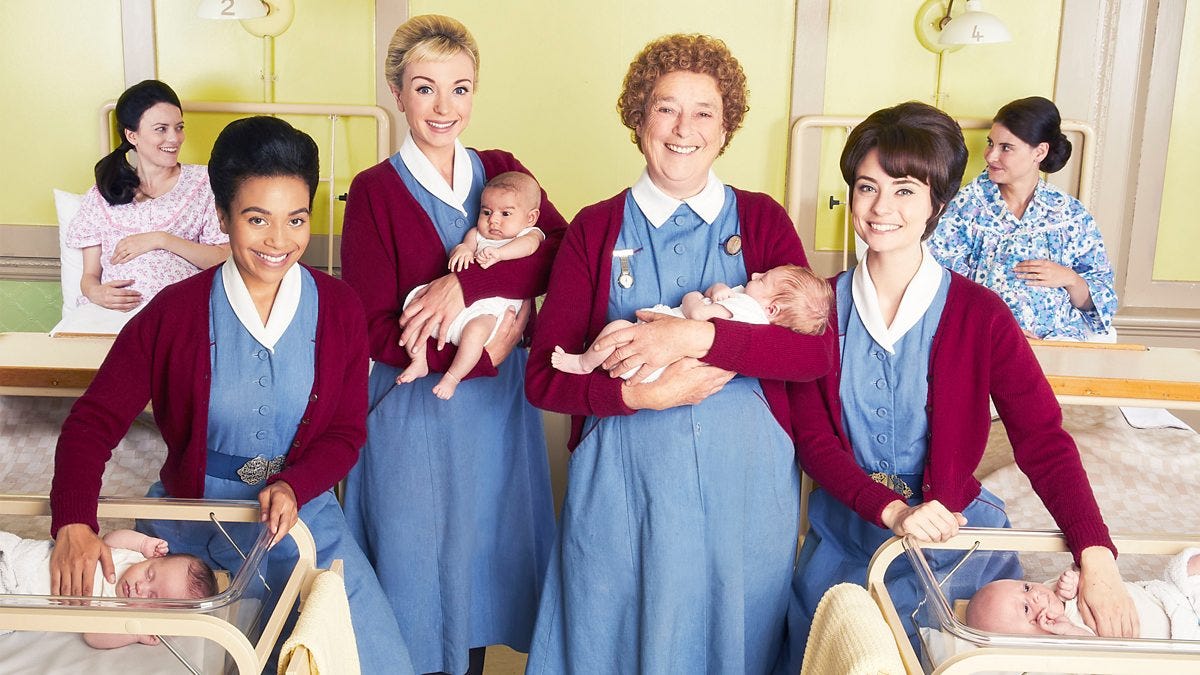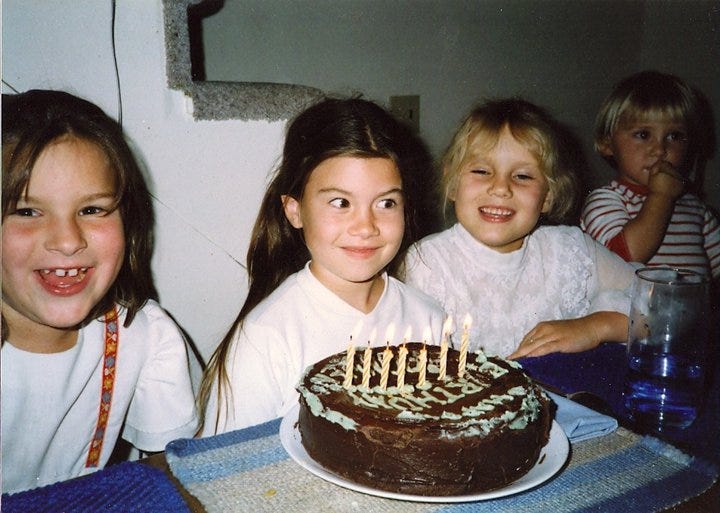Birthday Soup
Milestones, Saskatoon Berries, Craft and Culture, Matthew Salesses, Zoom Book Launch, Call the Midwife, and yes, a recipe for Birthday Soup
Hello Friends!
Today is my 40th birthday! And my first book was published 10 days ago! It’s strange to reach these two big milestones so close together and amidst the constraints of living in a new city in a pandemic. As with other big moments during Covid, I’ve had to resist a temptation to just pretend these things aren’t happening until they can “happen properly.” As if I could somehow set my expectations so low that I won’t feel the gap between what I’d imagined and what is. Fortunately, I have wise friends who remind me not to be the thief of my own joy: “You can celebrate now and celebrate later,” Bridget texts.
So when my son offers to recreate my birthday dinner requests1 from when I turned seven, I say yes. And that’s a pleasure. And when a colleague says, “let’s go out and celebrate,” I say yes. And each time someone emails to tell me that my book has reached them, or shares a picture of the book next to their morning cup of tea, or texts me about a poem that’s lingering with them, that’s a big swell of pleasure.
Recently, I’ve been spending evenings snuggled up on the couch with Vesper and Owen and the various foster kittens (though as of last evening we’re finally down to kitty mama and the two kittens we’re keeping) watching The Great Canadian Baking Show. (I remember my friend Jessica once telling me this show featured “a lot of Saskatoon berries.” She’s not wrong. ) Maybe because I’m teaching a creative writing pedagogy course for MFA students this term—or, yeah, maybe just because I’m me—, I’ve been thinking about how the judges give feedback on the bakes and about the whole feedback enterprise that’s so central to creative writing workshops. And yes, this is judging not just feedback, and it’s a competition and all that, but still.
A few preliminary observations:
Begin with description. As writers (and as readers giving feedback) we often want to jump straight to what’s working/not working, but it’s so important to start with what we’re actually perceiving, in the act of description. I get that on baking shows these lush litanies of details are partly about making the audience feel like we’re vicariously eating a crisp and marshmallowy pavlova with tart passionfruit curd or a creamy ganache. But to give meaningful feedback on something, we have to start by simply describing what we’re perceiving. Often, in these acts of description, differences in perception become clear: “I thought this was about a boyfriend. It’s about your grandma? Let me see if I can find what made me think that or if I was just jumping to conclusions. . .” a student says. And how freeing for us as readers and teachers to release ourselves from the expectation of giving a verdict or judgment. Instead, we can offer our attention, our deep noticing.
We need a shared understanding of goals. The only time bakers don’t share their intentions and goals first is the technical bake, when there’s a common goal and a standard understanding of an externally established standard (tender crumb or crisp pastry or evenly cut squares). Why do some writing workshops still want to treat everything like the technical bake? Why assume that there’s a shared understanding of what the ideal finished thing should be when we might aspire to so many different possible goals? When a writer shares intentions, we can talk about where the work is relative to those intentions, what’s already there and what’s still potential (or where a writer might swerve with a happy accident).
Craft (like taste) is cultural. Every time I see a baker from a non-North American/ Euro food tradition reach for the rosewater or matcha, I get a little nervous. The original GBBO (and what I’ve seen of the Canadian version so far) has mixed results when it comes to this. The shows love to talk about bakers cooking from their cultural roots, and judges will warmly praise the use of cardamom or yuzu, but they sometimes seem less willing to consider the cultural palate they bring to a question like “how much rose water is too much rose water?” As writers, readers, and especially (!) writing teachers, we absolutely need to turn a questioning eye to the “cultural palates” we bring to our reading responses. If you’d like to think more about how and why to do this, I super enthusiastically recommend Matthew Salesses’ Craft in the Real World. This book was an “underlines and marginal notes on every single page” read for me, and I feel so lucky to be able to share it with pedagogy and poetry students this term.2
“In the same way, to tell a story based on a character-driven plot or a moment of epiphany or a three-act structure leading to a character’s change is to subject story to cultural expectations. To wield craft morally is not to pretend that those expectations can be met innocently or artfully without ideology, but to engage with the problems ideology presents and creates.” —Matthew Salesses, Craft in the Real World, 29
I Wrote About Reading! I Wrote About Writing!
“Looking back at “Chanson d’Après-Midi” and “The Stolen Child,” I can certainly see why they appealed to high school me: the obsessive attention to eyebrows and the “eye soft as the moon” in Baudelaire, the child stolen by fairies and all that lush rhyme in Yeats. But I’m struck also by the ambivalence and friction in both poems.”
I wrote about poems by Yeats and Baudelaire and some books by Hoa Nguyen, Barbara Jane Reyes, Lorine Niedecker, and Alice Oswald that have been important to me for Etcetera Poetry.
“During my MFA back in 2004, I tried to explain to my sister what writing poetry felt like: ‘It’s like spending time with words as words.’ I meant that writing poems involved engaging with words not just as vehicles to represent thoughts, feelings, and ideas, but as objects in their own right in all of their particularity: sounds, patterns, connotations, associations, etymological roots, and so on.”
I contributed a little essay on my writing process for rob mclennan’s Talking Poetics Series (which has a really rich archive).
A Few Upcoming Events
The Creative Writing Studies Organization virtual conference is tomorrow and Saturday. The theme is “Creative Writing as Care” and the conference has adopted a really smart approach: a video and text version of each talk is available well ahead of time (and after), and panels will convene for 30-minute Zoom Q & A sessions throughout October 8th and 9th. My colleague John Vigna and I will be both be presenting (I lucked out and got the 8:30 am PT Q & A slot, while he has the unenviable 6:30 am PT slot). In my (first Prezi!) video talk, I walk through how I’ve designed a series of writing habit reflections, experiments, and report-backs drawing on Helen Sword’s terrific Air & Light & Time & Space.
I’ll be reading via Zoom on October 15th at 6 pm PT / 9 pm ET with my press-mate Adam Daniel Martinez and some amazing guests to launch our new books. I would love to see you if you can make it.
Birthday Soup
Since I’m writing on my birthday, I felt like I should be sending you a cake recipe. But, while I bake quite a lot of cake, I’m not sure that I have an original recipe to share just yet. But I do have a recipe to share with you that’s at the intersection of pasta and soup (stay with me), and I realized there’s an excellent precedent for birthday soup in the classic Little Bear.
So here it is:
Birthday Soup
Ingredients
1/4 cup olive oil
1 onion, chopped
1 sprig rosemary
2 garlic cloves, smashed with the side of a knife
28 oz can of tomatoes3
28 oz can of chickpeas (or about 2 cups cooked from dried)
2 cups broth (or water is fine) (or more like 3 or 4 cups if you want it more like soup and less like pasta)
1 cup small pasta (orzo, acini di pepe, alphabets, whatever)
optional but nice: a creamy cheese like good ricotta or burrata
Heat the 1/4 cup olive oil in a pot or dutch oven at medium heat. Add the chopped onion and sauté for about five minutes. Add the sprig (or two) of rosemary and the smashed garlic cloves and simmer until you can really smell them, a minute or two.
Add the can of tomatoes, smooshing them up a bit with your hands or a spoon if they’re whole, along with 2 cups (or more for more of a soup vibe) of broth (chicken or vegetable) or water, and the chickpeas. Season to taste with salt—how much you need will depend on whether you’re using a salty broth or not.
Cook for about 20-30 minutes at a simmer until everything is nicely merged and the tomatoes have mostly broken down.
Stir in 1 cup of small pasta and simmer until the pasta is cooked through (might take a little bit longer than what it says on the package but not much). The texture should be almost like risotto or a thick stew.
Top with any (or any combination) of the following: fresh ricotta or burrata, a drizzle of olive oil, chopped parsley or basil, a pinch of flaky salt, ground pepper, grated parmesan or romano.
Enjoy! If you make it, let me know how it comes out!
And get in touch! What writing or teaching or cooking challenge is making you say “Ok, but how?” these days?4 What wise advice do you have for me on turning forty? What were your favorite foods when you were turning seven? Hit reply and let me know! And if you’re reading this in your browser, maybe, you know,
Very best wishes,
Bronwen
PS: A final tip! People recommend talking to yourself the way you would talk to a friend when you hit a difficult spot in your writing and you’re feeling a lot of frustration. I am only slightly embarrassed to admit that I recently noticed my version of this is talking to myself in the voice (yes, complete with accents) of the various midwives from the show Call the Midwife. Seriously. I alternate between them. Sometimes it’s Trixie saying “Ok, sweetie, you’ve been very brave,” and sometimes it’s Lucille saying “Well done, precious.” I sincerely recommend this. I’m not a huge fan of comparing books to babies and writing to birthing, but I do think both efforts benefit from kindness and support. And sometimes we need to be the ones to offer this kindness and support to ourselves.
Another crucial text for the pedagogy course is Felicia Rose Chavez’s The Anti-Racist Writing Workshop: How to Decolonize the Creative Writing Classroom, which I look forward to saying more about in a future post!
Whole or chopped tomatoes are both fine, but use good San Marzano tomatoes if you can possibly find them. A lot of canned tomatoes are really watery and just stay in sad chunks and never melt into a nice rich sauce. You deserve better from your canned tomatoes.
Seriously, email me. There is no more appealing form of virtuous procrastination than trying to solve other people's process challenges. And sometimes something comes clear for me as well.

